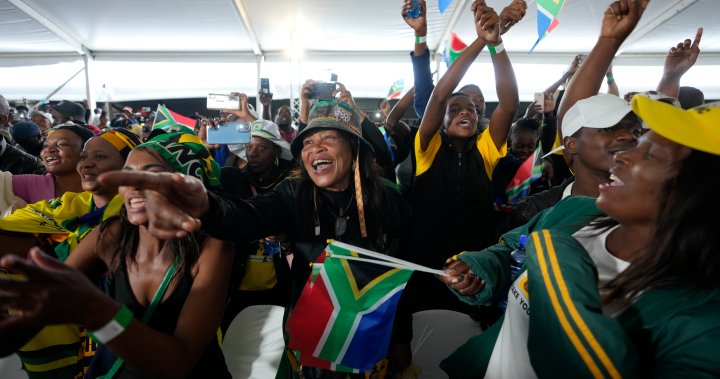
South Africa marked 30 years since the end of apartheid and the birth of its democracy with a ceremony in the capital Saturday that included a 21-gun salute and the waving of the nation’s multicolored flag.
But any sense of celebration on the momentous anniversary was set against a growing discontent with the current government.
Canadian man dies during Texas Ironman event. His widow wants answers as to why
More on Politics
The official unemployment rate is 32 per cent, the highest in the world, and more than 60 per cent for young people between the ages of 15 and 24. More than 16 million South Africans — 25 per cent of the country — rely on monthly welfare grants for survival.
South Africa is still the most unequal country in the world in terms of wealth distribution, according to the World Bank, with race a key factor.
While the damage of apartheid remains difficult to undo, the ANC is increasingly being blamed for South Africa’s current problems.
In the week leading up to the anniversary, countless South Africans were asked what 30 years of freedom from apartheid meant to them. The dominant response was that while 1994 was a landmark moment, it’s now overshadowed by the joblessness, violent crime, corruption and near-collapse of basic services like electricity and water that plagues South Africa in 2024.
It’s also poignant that many South Africans who never experienced apartheid and are referred to as “Born Frees” are now old enough to vote.
Outside the tent where Ramaphosa spoke in front of mostly dignitaries and politicians, a group of young Black South Africans born after 1994 and who support a new political party called Rise Mzansi wore T-shirts with the words “2024 is our 1994” on them. Their message was that they were looking beyond the ANC and for another change for their future in next month’s election.
“They don’t know what happened before 1994. They don’t know,” said Seth Mazibuko, an older supporter of Rise Mzansi and a well-known anti-apartheid activist in the 1970s.
“Let us agree that we messed up,” Mazibuko said of the last 30 years, which have left the youngsters standing behind him directly impacted by the second-worst youth unemployment rate in the world behind Djibouti.
He added: “There’s a new chance in elections next month.”